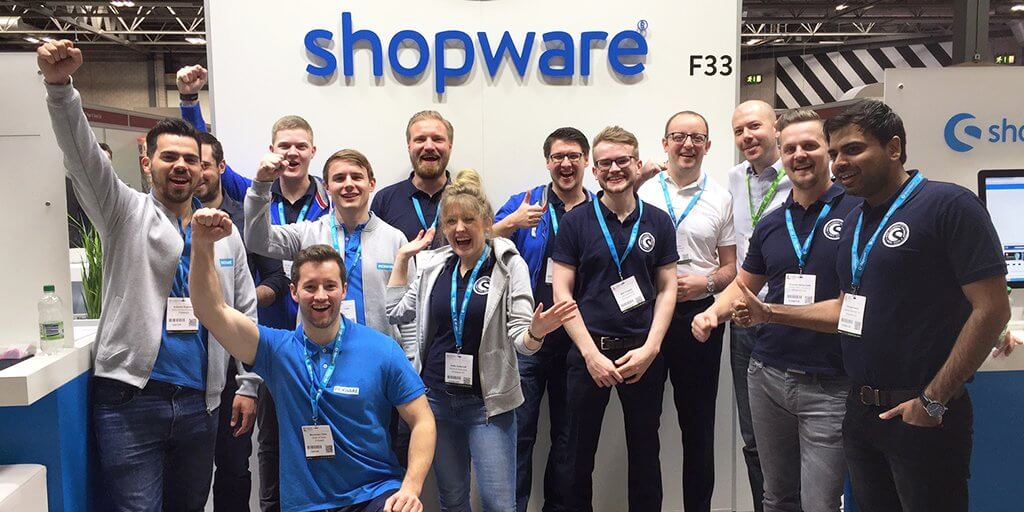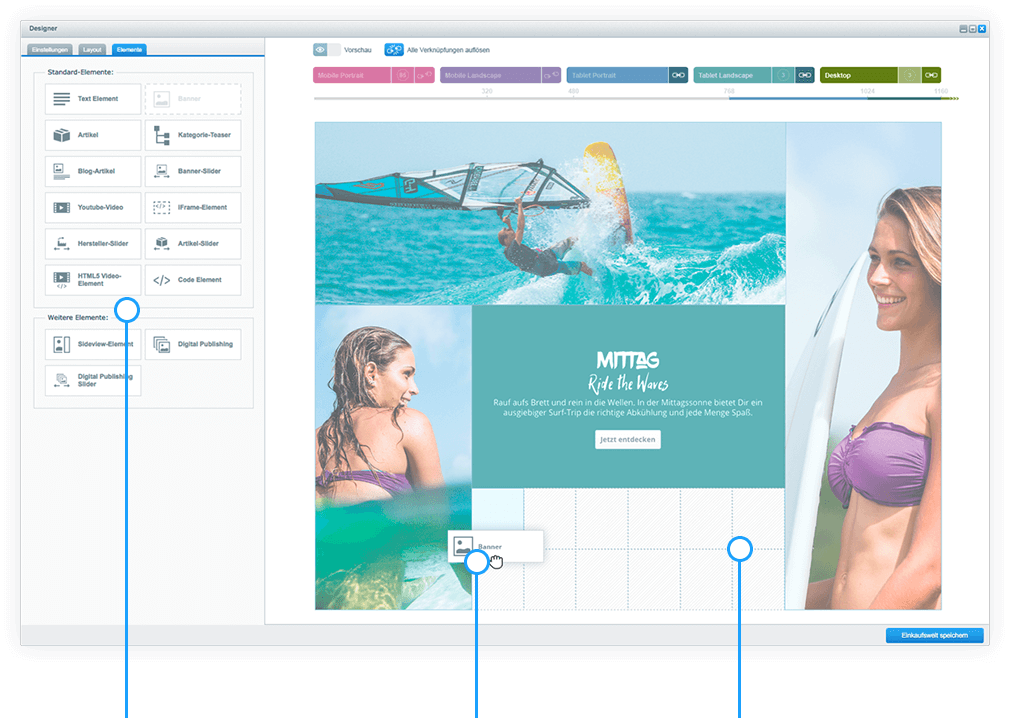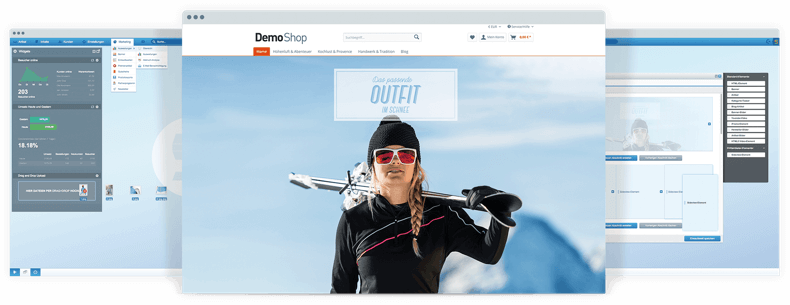
Over the last 6 months or so, I’ve been looking at various different platforms that are in the same market as Magento Enterprise and the higher end of Magento Community – including Shopware, which is a German solution which has recently entered the UK market.
I was broadly aware of Shopware from a few conversations I’d had with German merchants but wasn’t really aware that it was coming to the UK before I discovered that Deepak (who I knew from his Magento days) had joined as UK Country Manager. After reaching out to him, Deepak kindly arranged for a series of product demos, so I could understand a bit more about how Shopware stacked up against some of the other platforms in this space (Magento EE & CE, Shopify Plus, the lower end of Demandware etc).

I did the first demo alongside a client, who had been looking at Shopware Enterprise, and I was really impressed – particularly with the CMS offering and the new dealer integration, which is great for merchants who are looking to manage re-selling relationships (such as franchising or drop-shipping for example) via one centralised platform. This solution allows the merchant to allocate and manage re-seller inventory, provide different content, make decisions around available products and manage releases on storefronts that are essentially under their control.
The CMS side of things is very impressive with Shopware (this is an area where most of the other comparative platforms aren’t particularly strong) and they give admin users a huge amount of control over the look and feel of CMS pages and the types of content being displayed. Magento recently acquired Bluefoot (previously a premium Magento extension, created by Gene), which will provide different blocks / widgets and drag and drop functionality, but Shopware go a bit further and allow for things like shoppable banners and video and more complex page layouts, which includes things like paralax banners etc. I’d say that this is a big feature for Shopware in comparison to the other platforms.

Other features that I thought made Shopware Enterprise a serious contender in this space include:
- Built-in customer loyalty tools
- Built-in ERP tools for smaller merchants
- Strong out of the box reporting
- Support for a broad range of catalog promotions
- Strong multi-store capabilities, built around internationalisation (similar to Magento)
- Lots of existing integrations with popular third party solutions (ERP, WMS, marketplace etc) and good API for integrating to other systems
- Advanced attribute management
- Live preview feature for content and products
- Good range of premium extensions developed by Shopware
- Strong, active community of developers
These are just a few features that I really liked – I would say that overall Shopware looks like a very interesting solution and it is the market leading platform in Germany, with a bigger market share than Magento. They also power stores for some really big brands in Germany, such as Brita, Euronics, Kiehl’s, Dortmund FC, L’oreal, Grohe, Space NK and various others.
I also recently asked GPMD’s (an eCommerce agency that I previously co-owned) developers to look over Shopware’s solution from a technical perspective and they were very positive. PushOn, another eCommerce agency I really respect have also recently started supporting Shopware and they were very positive about all aspects of it when I spoke with Simon and Sam.
To provide some more information about Shopware and how they’re entering the UK, I asked CEO Stefan Heyne to do a short interview around their core features and their plans, which can be seen below.
Tell us a bit about Shopware – when you started, how big the team is, the overall focal areas as a business etc.
Back in 2000, when Stefan Hamann, one of the three founders, was 16-years-old, he started a classic web agency, so creating mostly website and flyers. That was until 2004, when he received his first customer request for an online shop. After programming the client’s webshop, he offered the software as a standard solution, which became the basis of Shopware. There was nothing else like it on the market at the time. The company has since grown from a small platform programmed out of Stefan’s parent’s house to a company of nearly 120 employees – most of which are focused on product development – and is the trusted solution for over 54,000 online shops. The power of the platform’s flexibility is what has made Shopware one of the leading open source platforms in Europe. With our vibrant ecosystem of innovative solution partners, technology partners and developers, we’ve enabled an estimated €5bn in annual online volume and continue to nearly double in growth every year.

What area of the eCommerce market are you targeting with Shopware – what does an ideal Shopware merchant look like?
We are covering the whole range: from small to medium-sized businesses and scaling up to big enterprise players such as EURONICS, L’Oréal or PerfectHome. Our fastest-growing sectors are the retail and B2B sectors. Due to our flexibility and scalability, Shopware is the ideal solution for brands who want to move one step forward with one of the most advanced eCommerce platforms on the market.
There’s lots of talk in the UK about Shopware – how big is the UK for you and how big do you think it can be?
The UK is the largest, most dynamic and fastest-growing eCommerce market in Europe. What we have discovered is that UK merchants – despite having the greatest online turnover in all of Europe – often lack a reliable, feature-rich and a scalable eCommerce platform. This is exactly what we are providing and our first beacon projects have proven that there is a huge demand for Shopware in the UK. In other words, we expect the UK to become our second biggest market for Shopware in Europe. We are fully committed with the UK market and have a newly established local presence with our new General Manager Deepak Anand who has spent numbers of years with Magento and other retail technologies.
What are the main features and selling points of using Shopware?
Our out-of-the-box enterprise capabilities for content management, merchandising, segmentation and promotions allow merchants to focus on what’s important for their business and customers. Our CMS features help them bridge the gap between content and commerce and allow them to create personalised experiences that meet the demands of connected consumers. We offer a solution that can be adapted to unique business needs.
Shopware empowers brands with a rich set of features that help them to stand out from their competition and create individual consumer experiences that are unique for their brand. Our flexibility, best-of-breed enterprise features and modularity enable brands to quickly implement their project and get their business running in relatively no time at all – a crucial factor in one of the fastest moving industries. The cost to implement and maintain Shopware is the lowest of any other enterprise solution on the market. With Shopware, brands will be able to do more with their eCommerce budget than with any other platform. Shopware’s extensibility, scalability and flexibility – not to mention complete access to the source code – give merchants absolute freedom when it comes to adapting the software to meet their individual requirements.
Magento and Shopify Plus are obviously big competitors in the mid-level eCommerce market – how does Shopware compare to these solutions? Why would a merchant typically select Shopware over these platforms?
First of all, with one-time license fees and a very short time-to-market, when compared to Magento, Shopware has a lower total cost of ownership. Furthermore, Shopware’s intuitive backend leaves merchants more time to focus on other aspects of their core business. Being German engineered, Shopware has an efficient architecture and its database structure enables the system to be high-performant and incredibly fast.
Magento, for instance, is creating a great deal of uncertainty as of late – especially with the announcement that they would be discontinuing support for their 1.x platform and releasing Magento 2 with a completely different architecture. Shopware is filling this gap by providing brands a scalable, flexible, feature-rich platform that offers 24/7 service & support contracts as well as personalised consultation from experienced eCommerce professionals.
Shopify Plus is an SAAS platform, and we actually see that a small segment of brands require a SAAS solution.
The biggest challenge with Shopify Plus is internationalisation, so brands who want to pursue international growth might inevitably have to consider replatforming or look into other alternatives. Secondly, integrating any existing ERP or enterprise solutions with Shopify significantly increases your costs. Thirdly, with most of the SAAS platforms, you don’t get the flexibility you need to turn your vision into a reality.
Every brand’s eCommerce requirements are completely individual, so of course their reasons for choosing Shopware differ from one another. But we find a few common themes in the decision-making process of many of our customers. It all comes down to Shopware’s flexibility, extensive set of native features, scalability and ability to deploy faster than any other eCommerce platform on the market.
A number of well-known eCommerce agencies have recently joined the Shopware partner program – how important is the partner channel for Shopware as part of your growth strategy in the UK?
Great software is the foundation of our solution, but the unique benefits of our platform come to life with the help of our partners.
Shopware has built a vast network of more than 1,200 partners – everything from technology, solution, and hosting partners. With a number of experienced Shopware developers on their team, solution partners are a critical factor of our strategy; these partners have demonstrated expertise in eCommerce, developing Shopware solutions and know how to configure and customise our platform to meet brands specific needs. UK solution partners include Retail Reply, Tech Huddle, PushOn, One Creations, CB Squared and many more.
What’s next for Shopware – what new features and functionalities do you have in your roadmap for the next 6-12 months?
The next big thing coming up with Shopware is our version 5.3, which will be presented at this year’s Shopware Community Day. With Shopware 5.3, we’re moving even closer towards the customer’s needs. This is because in the future, the consumer will be even more in the foreground. Since their behaviour is actively changing the market, the software’s flexibility and short time-to-market will become increasing more decisive so that untapped or new sales channels can be exploited as soon as possible. We also believe the slogan “Community driven” is becoming more important for incorporating feedback, ideas and innovative potential directly from the Community. We face these challenges with a transparent roadmap and strong involvement from our Community. Additionally, we invest nearly 20% of our annual profits in research and development in order to continue providing relevant solutions that meet the demands of the future.
—
Although I am still very pro Magento and Shopify Plus, I think Shopware is a very interesting platform that is directly comparible to Magento 2 in particular. I’m intrigued to see how it progresses in the UK market in the coming months.
If you want to find out more about Shopware, visit their site here.